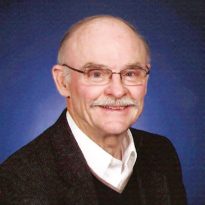IT WAS MAY 2007, seven years after Father John Kaiser’s death. I was with a delegation of students and faculty from the College of St. Benedict and St. John’s University to Kenya. We had a series of site visits arranged by Catholic Relief Services to gain firsthand experiences of programs aimed at issues like poverty reduction, agricultural development, human rights awareness and so on.

Among the pre-arranged contacts was a face-to-face visit with the director of the Kenya National Commission on Human Rights. Unlike many other official government departments, the KNCHR was generally respected for its integrity.
We were ushered into a fine conference room in a very new building. I still remember the “new smell” of it all. Then the director himself joined us — a stately fellow exuding a bit of gravitas. After an overview of the KNCHR role and responsibilities for the entire country, he asked us about ourselves. When we identified ourselves as being from St. John’s and St. Ben’s, his eyes lit up. “You mean you are from Father John’s Kaiser’s school?” When we affirmed this, he said, “Come with me.” [He led us] down the corridor to another brand-spanking new room. There on the upper door jamb was the name plate: “Father John Kaiser Conference Room.”
He also gave us a copy of the “Lifetime Achievement Award” that they posthumously granted to Father Kaiser in 2006.
I share this long introduction to make an important point: John Kaiser was a very significant national figure in Kenya. I often label him to the likes of Dr. Martin Luther King, Jr. here in the States. And, like Dr. King, John Kaiser’s legacy remains to this day a very significant presence in this long-suffering country.

Also, like Dr. King, John went out of his way to search for the causes that made him the point of the spear confronting injustice on a grand scale. He joined that fray because it was in his face, it was personal, he could not look away because it involved the people he loved, the people he had committed himself to accompany and serve for his entire life.
Doing so, of course, led eventually to his death. But in the process, he needed to regularly reassess his commitment to this prophetic role. He was well aware that he was literally confronting the most powerful people in the entire country. In fact, his religious superior and his bishop more than once advised a more cautious, lower key approach, for his own sake. Since John and I spent a lot of time together, he told me that both of these men directly encouraged him to take a leave, go home and let the dust settle here in this contentious environment before coming back.
While John felt it was necessary to take up a number of causes on behalf of the people he “walked the walk” with, the two big ones that he could not let go were, first, the massive dispossession and displacement of thousands of the people with whom he spent many years. Greed and corruption by powerful people allowed them to simply take their land by force. When I traveled with him, he carried a large folder with all sorts of documentation showing title ownership that he would later use unsuccessfully in court. Much of this then became the contents of his book “If I Die.”
Secondly, he really poked a big stick in a snake’s den when he took up the criminal case on behalf of three young women charging the second most powerful man in Kenya of rape. As expected, like his first public stance defending the displaced people, this one also became major, national news. BBC even picked up on this one! Having John’s picture appeared on the front page of the Daily Nation. Collectively, these issues seemed to be the tipping point where those who could end it all just said “enough.”
On receiving word of his death, Bishop John Kinney asked that I go to represent our diocese at John’s funeral…actually we had four different services around the country. Every Kenyan bishop, except for a couple, attended the first at the basilica in Nairobi. The apostolic nuncio was the main celebrant and homilist. He delivered a very direct and strong statement regarding the causes of justice that brought about John’s death. That large church was filled with hundreds of clergy and religious women, while an overflow crowd filled the courtyard area outside. It was an honor for me to speak on behalf of the Church of St. Cloud at each of these services.
Incidentally, at the last site, out in the bush area he loved and where he spent his last years, where his body now rests, I met one of the women who John supported in the rape case. As we interred John’s body, she profoundly wailed her grief, since she was by then the final one of the three women, all of whom were forced to drop the rape case after John’s death.
As for John’s ongoing impact on the life of ordinary Kenyans, one example: each year the Kenyan Episcopal Conference promotes a Lenten theme. Virtually every year John Kaiser is featured in the promotion in some way to inspire the nation on how to live life worthy of Christian discipleship.
In keeping with the parallel with Dr. King, perhaps John Kaiser’s legacy can be likened to the recently deceased King protégé, Congressman John Lewis. In his final statement, released after his death Lewis said, “Though I may not be here with you, I urge you to answer the highest calling of your heart and stand up for what you truly believe.” Indeed, Father John Kaiser would ask the same of his beloved Kenyans and of us.
////////////////
FATHER BILL VOS is a priest of the St. Cloud Diocese and the diocesan director of Catholic Relief Services.






















